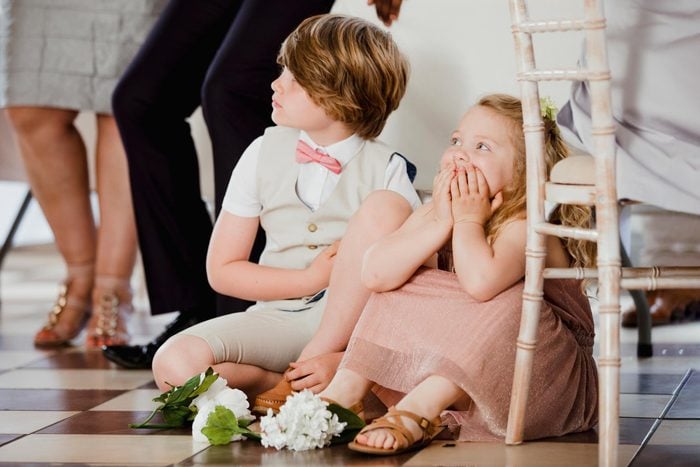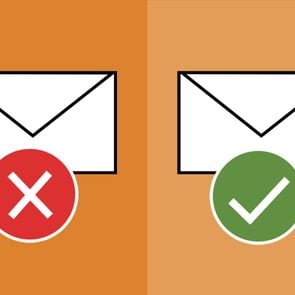How to Say No to Kids at a Wedding Without Offending Anyone
Updated: Jan. 31, 2024

Planning an adults-only big day? Etiquette experts share their secrets for saying no to kids at a wedding with elegance and grace.
Amid all the fun and exciting details of planning your nuptials, there’s one wedding etiquette decision that requires a touch of finesse: navigating having an adults-only celebration. Delicately breaking this news to friends and family is never easy or pleasant. When planning my own big day, learning how to say no to kids at a wedding felt more nerve-racking (and high stakes!) than finding the perfect dress.
But fear not. Experts say there are methods for gracefully and politely informing guests that your wedding will be a grown-up affair. “Hosts have every right to have the adults-only party of their dreams,” says Heather Wiese, a Dallas-based etiquette expert. “As wonderful as children are, their place is not at all weddings.”
Still, the intentionality in communicating this is real and potentially relationship-challenging, Wiese says, which is why it’s essential to do it well. We asked experts to share their advice for how to say no kids at a wedding in any scenario. From the proper wedding invitation etiquette to crafting the perfect language, these are their top etiquette tips.
Get Reader’s Digest’s Read Up newsletter for etiquette, humor, cleaning, travel, tech and fun facts all week long.
How to say no kids at a wedding
Limiting your wedding guest list to adults is not an uncommon occurrence—in fact, it’s common at engagement parties and wedding showers too. And it requires nothing more than a short and sweet explanation. Ultimately, “the wording is the choice of the couple,” says Jackie Vernon-Thompson, founder and president of From the Inside-Out School of Etiquette. “Just keep in mind class, tact, consideration of feelings, brevity and simplicity.”
There are a variety of ways to let your guests know your wedding wishes and that you plan to have an adults-only wedding, whether it’s through a personal phone call, invites or wedding websites. Here’s how the experts suggest you do it.
Share it on the invitation
If you’re planning to add a note about your adults-only wedding on the invitation itself, experts say to proceed with caution. “When someone receives an invitation that explicitly excludes anyone, including their child, the delivery worded on the invitation can and often does come across as rude,” Wiese says.
Vernon-Thompson agrees. “This is an extremely sensitive message that must be conveyed with class and consideration because you don’t wish to offend a potential guest,” she says.
Wiese recommends addressing the envelope to the parents or adults in the household only, which implies that the kids should stay home. Another subtle way to suggest that only the parents or adults are invited is to note the number of reserved seats on the RSVP card.
Share it on an invitation insert
Not keen on adding wording to your invitation? Consider placing the message on a separate insert card—as long as the wording is considerate, says Vernon-Thompson. She recommends language such as “We adore your little ones. However, our wedding events will be for adults only,” or “We are excited to celebrate our nuptials with you at an adults-only ceremony and reception.”
Add it to your wedding website
Websites offer a more polite medium than invitations for spreading the word that you’re having a kid-free celebration, according to Wiese. “What’s beautiful about the modern website is that the wordy, unconventional language that should never see the paper of the invitation can be added relatively easily and with graphically designed hierarchy right there on the website for all to see,” she says.
Along with information like wedding attire, wedding gifts and hotel blocks, you can include a note that your wedding will be child-free. Some couples may put the message in an FAQ section on the website, while others place it at the bottom of the home page. A simple line saying “Please note this will be an adults-only celebration” should do the trick, experts say.
Spread the word yourself
From an etiquette standpoint, word of mouth can be another polite and accepted way to communicate that your wedding is child-free, according to experts. “People are going to talk about your wedding—so feel free to make this a point,” Wiese says. She advises prepping a one-liner that you can deliver to family, friends and other guests personally when your wedding comes up in conversation, such as “My partner and I have decided that we would like an adults-only celebration.”
“If you’re nervous about how it might be received, practice with a friend who gives honest feedback,” Wiese says. “Delivery is everything. It just needs to be one line. You don’t need to explain yourself. Then move on to more fun topics like genuine-interest questions about their life and activities.”
More language tips for child-free weddings
While simple language such as “No children, please. Adults-only ceremony and reception” will follow proper etiquette, you might have some caveats to saying no kids at a wedding. Here’s what to know.
When including kids 18 and older
If those 18 and older make your guest list (they can handle your best man’s wedding toast), you’ll want to be especially careful with wording. For instance, if a household has both an 18-year-old and a 16-year-old and only the adult-age child is invited, you’ll need to take some additional steps to make that message clear. After all, it is ultimately your responsibility to “ensure your intentions for the invitation and the event are communicated and understood by the guest with the uninvited children,” Wiese says.
She recommends making a point to name each invited guest on the invitation envelope or RSVP card. “Seeing that one child’s name is on the envelope and the other is not, in many respects, makes the communication that much clearer,” she says. It is also considerate to share this information in person before sending the invitation, according to Wiese.
When including kids of immediate family
You may have exceptions to your child-free rule, such as including nieces and nephews in your wedding traditions. Wiese recommends not making it a big deal nor saying anything to guests ahead of time. “It’s one hundred percent the hosts’ discretion who is and isn’t invited,” she says. “Pointing out who is invited while talking about who isn’t invited is a potential train wreck.”
If you think someone might see a child attending and be upset, Wiese suggests casually bringing it up beforehand by saying something like, “The children with roles in the ceremony will be the only non-adults attending.” Otherwise—or if there are too many exceptions—Wiese advises against bringing it up at all.
When budget or venue space is limited
Whether you need to make your wedding a grown-up affair due to budget or venue constraints, “you don’t need to justify your choices,” Wiese says. “The elegance of etiquette effectively eliminates the need for justification.”
That said, you can always include language on your wedding website that addresses these constraints, such as “We regretfully cannot accommodate children at the venue due to limited seating,” or “Due to budget limitations, we are unable to extend the invitation to children.”
Worried about hurting someone’s feelings? Wiese suggests simply changing the subject if it comes up in conversation. “Sometimes, this is in the conversation itself, but most often it’s in your own mind as you dread the judgments of others who have decided you’re doing it wrong,” she says.
No matter how you convey these details, keep in mind that the sooner you learn how to say no kids at a wedding and let guests know, the better. “It’s important to get the word out well ahead of time,” Wiese says, to allows guests with children to make proper childcare arrangements before your big day.
About the experts
- Heather Wiese is a Dallas-based etiquette expert and the founder of Bell’Invito, a stationery company that designs luxury wedding invitations.
- Jackie Vernon-Thompson is a certified etiquette expert and founder and president of From the Inside-Out School of Etiquette in Miami. A licensed realtor for 23 years, she now trains and certifies aspiring etiquette consultants around the world through her five-week master class. She is the author of Transformative Etiquette: A Guide to Love and Refining Self.



